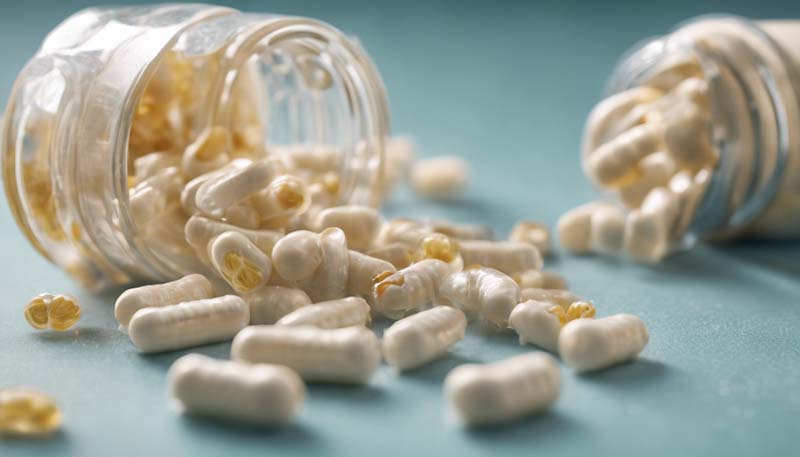The Role of Probiotics in Maintaining a Healthy Gut for Pets
2024-02-06 General Pet Nutrition 99 COMMENT
The Role of Probiotics in Maintaining a Healthy Gut for Pets
Probiotics are live microorganisms that, when administered in adequate amounts, confer a health benefit on the host. In the context of pets, these microorganisms play a crucial role in maintaining a balanced gut microbiota, which is essential for the overall health and well-being of our furry companions. This article delves into the importance of probiotics for pets, how they work, and the various ways they can be incorporated into a pet's diet.
What Are Probiotics?
Probiotics are beneficial bacteria and yeasts that are naturally found in the digestive tracts of humans and animals. They help maintain a healthy balance of good and bad bacteria, which is vital for proper digestion and immune system function. In pets, the gut microbiota is just as diverse and complex as in humans, and it plays a critical role in their health.
Why Probiotics Are Important for Pets
A balanced gut microbiota is essential for several reasons:
Advertisement
- Digestion: Probiotics help break down food, allowing for better nutrient absorption and more efficient digestion.
- Immune Function: A healthy gut microbiota supports the immune system by preventing the overgrowth of harmful bacteria and promoting the production of antibodies.
- Detoxification: Good bacteria in the gut help detoxify the body by breaking down and eliminating harmful substances.
- Mental Health: Emerging research suggests that the gut microbiota may influence mood and behavior, with probiotics potentially playing a role in managing stress and anxiety in pets.
How Probiotics Work
Probiotics work through several mechanisms:
- Competitive Exclusion: Beneficial bacteria compete with harmful bacteria for nutrients and space, preventing the growth of pathogens.
- Production of Inhibitory Substances: Probiotics produce substances that inhibit the growth of harmful bacteria, such as lactic acid, hydrogen peroxide, and bacteriocins.
- Enhancing the Gut Barrier: They help maintain the integrity of the gut lining, preventing harmful substances from entering the bloodstream.
- Modulating the Immune System: Probiotics stimulate the immune system, enhancing its ability to recognize and eliminate harmful pathogens.
Types of Probiotics for Pets
There are several types of probiotics that can be beneficial for pets:
- Lactobacillus: This genus includes several species that are commonly used in pet probiotics, such as Lactobacillus acidophilus, Lactobacillus rhamnosus, and Lactobacillus casei.
- Bifidobacterium: Another important genus of beneficial bacteria, Bifidobacterium species like Bifidobacterium longum and Bifidobacterium breve are known for their immune-boosting properties.
- Saccharomyces boulardii: This is a type of yeast that has been shown to be effective in managing diarrhea and other gastrointestinal issues in pets.
How to Incorporate Probiotics into Your Pet's Diet
Probiotics can be added to your pet's diet in several ways:
- Probiotic Supplements: These are available in various forms, including powders, capsules, and chewable tablets. Follow the manufacturer's instructions for dosage and administration.
- Probiotic-Enriched Foods: Some pet foods are now fortified with probiotics. Look for products that list specific strains of beneficial bacteria on the label.
- Fermented Foods: Feeding your pet small amounts of fermented foods, such as yogurt or kefir, can provide a natural source of probiotics. However, be cautious with dairy products, as some pets may be lactose intolerant.
Precautions and Considerations
While probiotics are generally safe for most pets, there are some precautions to consider:

- Consult a Vet: Before starting your pet on a probiotic regimen, consult with your veterinarian to ensure it's appropriate for your pet's specific needs and health conditions.
- Allergies: Some pets may be allergic to certain strains of probiotics or to the other ingredients in probiotic supplements. Monitor your pet for any adverse reactions, such as skin irritation or gastrointestinal distress.
- Storage: Follow the storage instructions on probiotic supplements to ensure they remain potent and effective. Most need to be stored in a cool, dry place, away from direct sunlight.
Conclusion
Probiotics play a vital role in maintaining a healthy gut for pets by supporting digestion, immune function, detoxification, and even mental health. By understanding the different types of probiotics, how they work, and the various ways they can be incorporated into a pet's diet, pet owners can take an active role in promoting the gut health of their beloved companions.
Always consult with a veterinarian before making any significant changes to your pet's diet or supplement regimen to ensure the best possible outcome for their health and well-being.
Comments